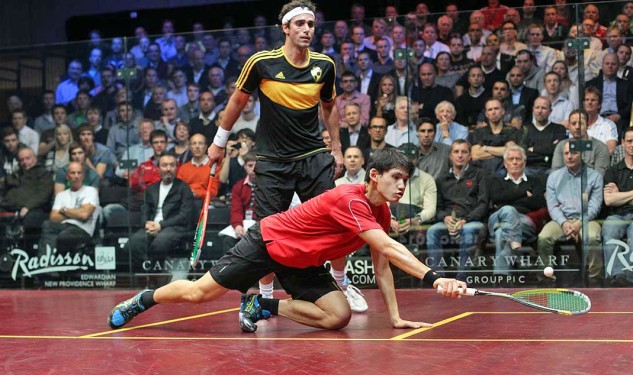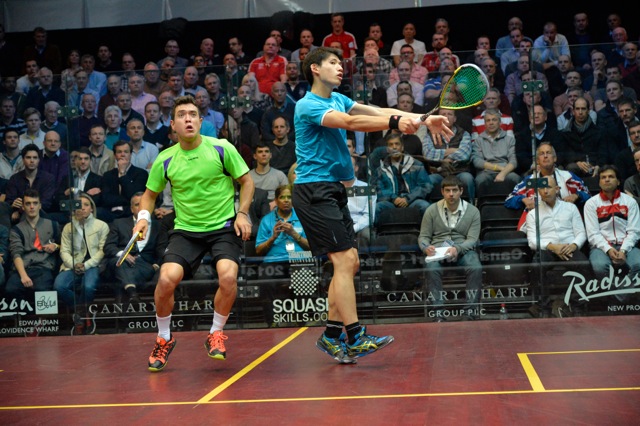
Canary Wharf win over Karim Darkish sparked rise up the rankings for Max Lee
By Alan Thatcher, Squash Mad Editor
Hong Kong number one Max lee has climbed to a career-high of 16 in the PSA World Rankings, and he puts his sudden surge down to the confidence he gained by beating Karim Darwish in last year’s Canary Wharf Classic. He put up a magnificent battle in the quarter-finals before bowing out to training partner Miguel Roriguez, the amazingly athletic Colombian, in a match lasting 78 minutes. Here he tells Alan Thatcher how things went right for him in 2014.
CANARY WHARF COUNTDOWN:
11 POINTS WITH MAX LEE
1: Max, your win over Karim Darwish at Canary Wharf last year was a massive result. How did you enjoy the experience of playing on the glass court at Canary Wharf?
A: It was a great experience, especially so because I was excited to win the match against Karim Darwish, which is my biggest win ever.
I love the crowd around the glass court. All the people are very close to the court, and they create a wonderful atmosphere. It’s clear that everyone in the crowd loves to watch squash. Also, it’s nice and warm on court. It’s a perfect temperature for me! Also, after losing so many times in the qualification round, it was my first time in the main draw, and the feeling was great.
2: What other highlights did you achieve in 2014? And how did your rankings improve?
A: I won my first 25k HKFC tournament in Hong Kong and reached my first 50k final in the KL Open in Malaysia, which gained so many point in my average ranking points. It makes my ranking suddenly going up a few places from 30. And then I reached the last 16 in the World Open and that pushed me to my best ranking of 16.
To move up you have to beat some players at the top of the draw, and clear the small points from your ranking average.
Last year I lost in the qualification rounds in the TOC, Motor City Open, Case Sweden Open, Windy City Open, and I didn’t apply for any points, which is very risky for my ranking actually.
But it has all happened since March last year, getting through the qualifiers and the first round at Canary Wharf, and then a few results came to me.
3: You are part of a very successful squad being coached in Florida by former world champion David Palmer. What are the main things you are working on?
A: The match play is my main thing. Plus lots of matches, movement and hitting, which is giving me more ideas to work on. He has taught me a lot of simple things, but it all needs time and a lot of hard work.
4: Miguel Angel Rodriguez (who you played in the quarter-finals last year at Canary Wharf) and Steve Coppinger are also part of that training group. That must be a fun group to be part of.
A: It is a lot of fun and I am very happy to be part of this group. All the fitness and squash training being competitive, means you have to work hard to improve your weaknesses during the routines and games with them. They are very kind to play with. And we know we are aiming for the same goal, that’s why we are there, to work hard.

5: What do you learn from each other?
A: We have different strengths on court. I can only say I have to catch up with their pace, because they are very fast and fit. So they make me busy on court all the time, but it does practice my mental strength to compare with those guys.
6: Does Miguel dive as much in training as he does in matches?
A: No, he doesn’t dive so much in the training. Normally, he will practice trying to hit better length shots all the time. He is very focused on the quality of the shot.
7: Where is home for you and your wife?
A: We live in Hong Kong. Rarely she can come with me to the tournaments, so sometimes it is a bit sad for me to be away from home.
8: How do you cope with the enormous amount of travel involved?
A: I am very lucky that we have back-up from the Hong Kong Sport institute and Hong Kong Squash. I get lots of financial support from them, meaning that I can travel far away from home for tournaments, or even overseas training to improve my squash career. It does mean an enormous amount of travel is involved, especially from Asia to USA or UK, which is expensive. So, if I didn’t have their support, it would be very tough for me.
9: How is junior squash growing in Hong Kong?
A: Junior squash in Hong Kong is growing stronger. Lots of kids are playing and learning. I didn’t see so many boys and girls in the junior nationals when it was in my time.
District training is growing in numbers, meaning more competition among the juniors coming up in the future.
10: You, plus brother and sister Leo and Annie Au, are flying the flag all over the world for Hong Kong squash. With these successes, is squash receiving more funding from mainline China?
A: Yes, we are receiving more funding after winning medals at the Asian Games, which is one of the major squash events for Hong Kong players. But we are receiving the funding from Hong Kong sport institute, not from China.
11: Apart from squash, how will you be spending your time in London on this trip?
A: Apart from squash, I would like to visit London with my wife, Sandy. Also, we stay with a friend, so I think it will be fun for us.
